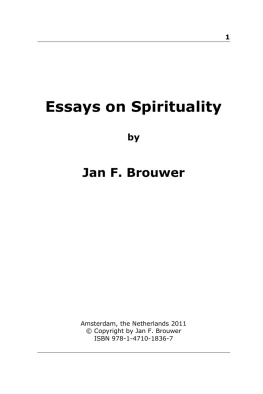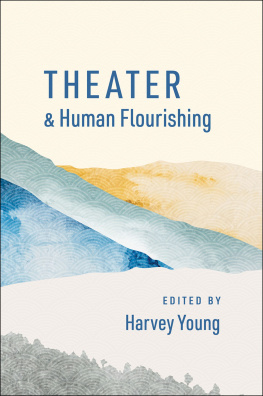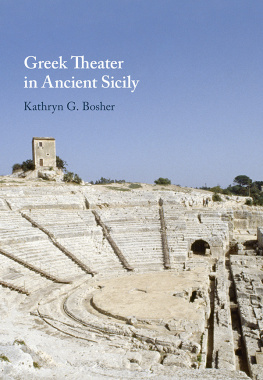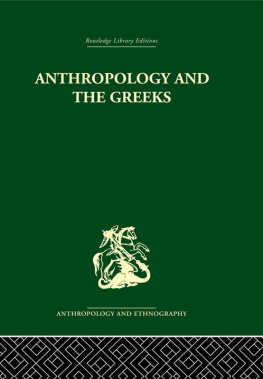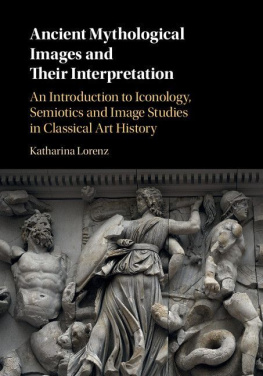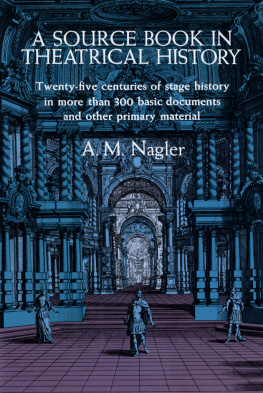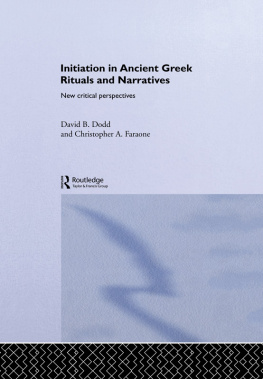Classical Greek Ritual TheaterA Study in CommunitasJAN F. BROUWER Lulu.com 2012 Classical Greek Ritual Theater Lulu.com Copyright by Jan F. Brouwer Amsterdam, the Netherlands 2012 All rights reserved. No part of this book may be reproduced in any form or by any means, electronic or mechanical, including photocopying, recording, or by any information storage and retrieval system, without permission in writing from the writer and/or publisher. First paperback edition ISBN 978-1-105-87867-1 Contents
Preface
4
Part I: Rituals of status elevation and status reversal 1. Introduction 2.
Van Gennep's theoretical sketches 3. Turner's elaboration 4. The topsy-turvy world: the game of inversions 5. Shared humanity 6. Communitas in liminality, marg. and inferiority 7.
From liminality to liminoidity Notes to Part I Part II: The development of classical Greek theater from cyclic and calendar rituals 1. The pre-theatrical stage 2. The theatrical stage Notes to Part II
Part III: Attic ritual theater
53
1. Introduction 2. Attic theater: liminal or liminoid? 3. Comedy: its liminal nature and function 4.
Tragedy: liminal nature and function Notes to Part III Classical Greek Ritual TheaterClassical Greek Ritual TheaterA Study in Communitas
Preface
In this study a cross-over will be made between two fields of inquiry. In the following chapters a theoretical model from anthropology will be applied to the phenomenon of classical Greek theater. The purpose of this cross-over is for us to gain a better understanding of the functionality of theater in 5th century Athens. It is primarily the intention of this new reading of ancient comedy and tragedy to offer a contribution to a more correct interpretation of ancient literary texts. Thus this book will show itself useful in the field of traditional philology. When we gain a better insight into the intentions the writers of ancient comedy and tragedy had, this will also contribute to a better understanding of the texts themselves.
Secondly this study wants to show itself useful in the field of anthropology, by giving examples from Antiquity underlining and clarifying the theories of Van Gennep and Turner. From an anthropological point of view it is interesting to see that Turner's findings not only clarify the functionality of non-theatrical rituals, but also the workings of theatrical rituals. First in Part I an explanation will be given of the theories of Van Gennep and Turner. Here some critical comments will be stated also. In Part II the theoretical model of Part I will be applied to Greek rituals. In due course it will be substantiated that ancient Greek theater arose from these rituals.
Finally in Part III the proposition will be stated that ancient Greek theater not only arose from pre-theatrical rituals, but still functioned as a ritual itself in 5th century Athens. This proposition brings us to apply the theories of Part I to ancient Greek theater. This will be the final content of the Part III. Classical Greek Ritual TheaterPart I: rituals of status elevation and status reversal1. introduction Human communities the world over and in the whole course of history perform at certain fixed moments in the year and periodically in the life of an individual, certain rituals. These rituals serve a purpose to both the collective and to the individual alike.
They are in tribal societies, but also in post tribal societies such as the Greek polis, an important means for mutual communication concerning the basic values of groups of people. Because basic values are strongly anchored in the unconscious and emotional part of our psyche, these rituals frequently use non-verbal symbolism, that the participants, by means of symbolic behavior and by using symbolic sacra, may ratify, by repeating and by exaggerating kinetically and vocally aroused feelings, to one another their beliefs in existential matters. Thus for example the use of the corn in the Eleusian mysteries of Demeter offered a symbol pointing to the notion of fertility (of the field as well as of animals and people). A symbol is a significant element in the rite and is frequently non-verbal. Thus it is possible for objects to have symbolic meaning, but also for ritual acts, activities of groups, relations between participants, events, gestures, dances, melodies, spaces, sounds, colors etc. (1).
But one can also make use of verbal symbolism, like it happens when the telling of a myth is coupled to the implementation of a rite (2). Thus the tale supports the rite in transmitting the basis values to all group members, in clarifying the cosmology of the group. The following analysis of the anthropologists Van Gennep and Turner will give us a better understanding of the phenomenon of ritual. 2. Van Gennep's theoretical sketches In 1908 the French anthropologist and ethnographer Arnold van Gennep published for the first time his Rites de Passage (3). In his own country the book got little attention.
It would take some sixty years to get its importance known to the world, by means of an English translation. This revaluation of Van Gennep is due especially to Victor Turner, who was inspired by the findings of Van Gennep to formulate his own theories about the functionality of rituals. Van Gennep saw that most rituals were held in times of transition ('passage'), not only to celebrate the transition of an individual to a higher status, but also to mark out the transition of a whole group to a next phase. He realized that e.g. the transition of winter to spring or of summer to autumn was celebrated with a ritual, like the transition of peace to war. At each breaking point in the social order of a society a ritual served the purpose of alleviating the tensions that had arisen.
Although the term rite of transition ('rite de passage') therefore also applies to the calendar rituals of groups, Van Gennep occupied himself foremost with the study of rituals of transition of individuals. On certain moments in their lives individuals were confronted with a number of serious life crises, like puberty, marriage, retirement, death (4). These life crises were not only in tribal but also in post-tribal, even in post-industrial societies, celebrated with often elaborate rituals. Van Classical Greek Ritual Theater Gennep distinguished three phases in such a 'rite de passage' (5): 1. Separation The first phase at the beginning of a ritual is a phase of demarcation and separation of the ritual (holy) space and time from the space and time of everyday life. The rite stands aloof from time.
The rite is timeless, 'time transcendent'. The religious dynamic of the ritual evokes a dimension of holiness to the happening. The values in the rite brought forward are seen to be eternal and invariable ( 'time transcendent). Inauguration rituals, like the puberty rites of boys and girls, use all kinds of symbolism like painting the boys or rubbing them with mud or faeces, to deny the initiandi all status distinction. The initiandi are reduced to a non-persona. Being the son of distinguished parents or a child of parents low on the social ladder is not significant in the ritual .
Your name is taken away from you, sometimes even your gender, by investing you with the clothes of the other sex. You become a prima materies. You are merely human in its non cultural, non social meaning. Calendar rites often enact spatial movement. A collective change of space like a procession symbolizes the change to a new situation or status. 2.
Transition (limen) This is the most important phase in the ritual. This phase marks out the threshold (limen) between the time preceding the ritual and the new time to come. This is frequently a period of complete cultural, social and cosmological chaos. The 'limen' phase is for the subject of this dissertation of the greatest importance. Later on we will study it more closely, reviewing its far-reaching implications .
Next page


